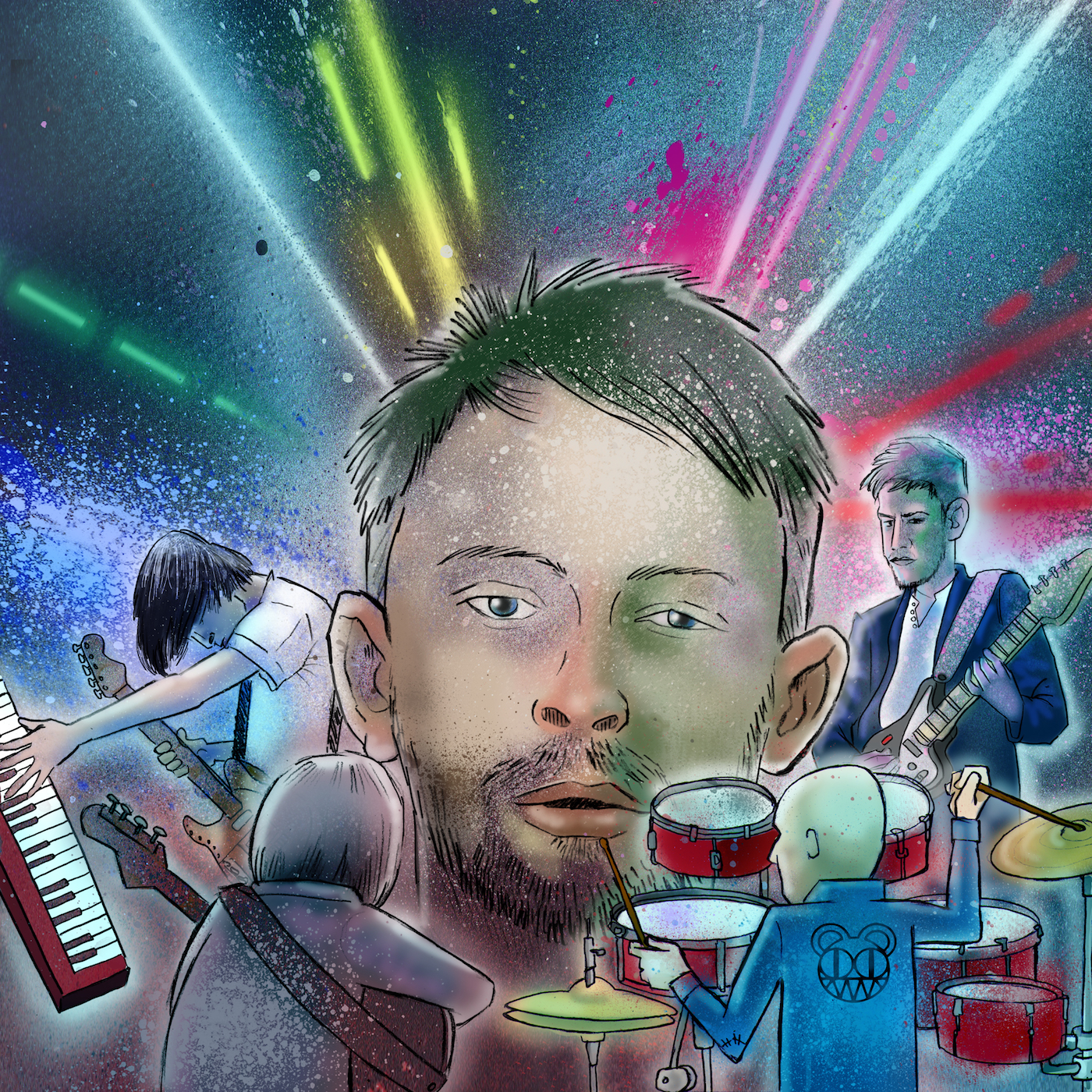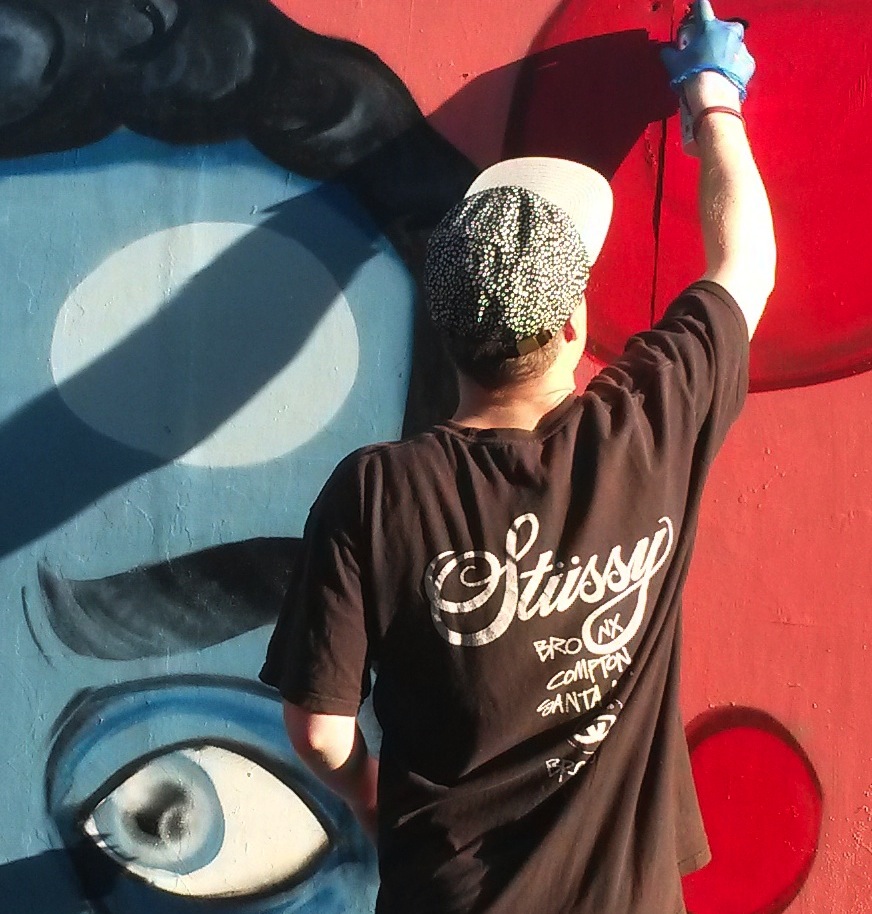Guest Album Review – “The Bends” by Radiohead
This guest review was originally part of a music blog project I created called Under The Deer. Since that site won’t be around forever, I’m archiving these wonderful reviews and their accompanying illustrations here. Writer and illustrator listed at end of the review.
It’s hard to believe, but it’s been 20 years since Radiohead became one of the most popular rock bands in music history with their third album OK Computer. Since then, they have released another three albums that could be considered classics: Kid A, In Rainbows, and their latest release, Moon Shaped Pool. OK Computer marked the band’s progress into more experimental forms of songwriting, leading to two decades of defining trends rather than chasing them. Yet in my obsessive opinion, OK Computer isn’t Radiohead’s most important album. Their sophomore album, The Bends is.
Being Radiohead’s most traditional rock and roll release, and with Radiohead so influential on the music scene at the time, it’s an album that came to define what British rock was from 1995 to about 2006. But The Bends frequently gets lost in the mix. OK Computer and Kid A may have been game-changers in terms of what a mainstream rock band could get away with, and In Rainbows is certainly the most pleasing listen for most fans, but The Bends was a game-changer for the band, and for me.

In a way, my changing taste in music mirrored Radiohead’s change in sound. After the success of their debut album Pablo Honey, and especially their mega-single Creep, Radiohead risked painting themselves into a corner as “the British Nirvana.” While Pablo Honey isn’t a bad album – Creep, Stop Whispering, You, and Blowout remain great songs – but it sounded like a band who were battering against a sound they were never entirely comfortable with. This led to the band adopting a comparatively lighter but more intricate guitar-driven sound, coupled with Thom Yorke’s increasingly cryptic lyrics. In the same way, it was bands with a simpler rock sound, like Nirvana and, alas, Coldplay (I was young and foolish) that led me to give Radiohead a try as they promised a deeper, more rewarding listening experience. Like many, I started with OK Computer, and I still love that album to this day, but it took The Bends to show me how utterly stunning traditional rock music can be.
The opening bars of Planet Telex felt like the musical equivalent of the stargate scene in 2001: A Space Odyssey, a huge wall of sound cracked open by Phil Selway’s drums and the three-guitar attack of Jonny Greenwood, Ed O’Brien, and Thom Yorke. Like Joy Division would confirm to me later in my teens, songs with lyrics like Everything is Broken (screamed almost triumphantly) could be endlessly cathartic. It’s the band’s best opening song to date. Then the title track, which Yorke himself has said many times is just nonsense that was a lot of fun to write and play. It’s also in The Bends that Yorke first mentions a need for connection: “I want to live, breathe, I want to be a part of the human race,” a theme that would recur throughout the album.
High and Dry was the first song I heard from The Bends, and its acoustic guitar and Yorke’s cherub-like vocal made it the easiest song to connect to at first. While it was one of the singles, Yorke has stated that he hates it and that it’s the worst song about nothing he has ever written. Not to me – it still gives me chills and remains one of the band’s more popular singles to date. As does Fake Plastic Trees which is rightly regarded as one of Radiohead’s best songs. Bones left me cold for a long time, nearly a decade in fact. It took me getting a little older to understand the fear and yearning within the music. It’s one of the album’s heavier tracks, but it deals, in an almost fairy-tale fashion, with getting older. Yorke’s declaration that “I used to fly like Peter Pan” harks back to a time of childish imagination, something we all must let go of at some point.
In spite of Yorke’s more impressionistic lyrics, there are themes that recur. The aforementioned need for connection and the breakdown of relationships can be heard in (Nice Dream), The Bends, the imploding relationship in the majestic Black Star, and Street Spirit (Fade Out).
Street Spirit is an almost elusive album closer. Nothing else on the album, or indeed anywhere else in Radiohead’s discography, sounds anything like it. Yet it is intrinsic to the album beyond its status as curtain closer. If we remember Planet Telex statement that everything is broken, Street Spirit tries to move beyond that cynicism. With Yorke’s relation to death, as action and as symbol, he takes the role of himself finding power and love in life just before it ends. The last line of the album is “Immerse your soul in love,” an achingly beautiful and positive note to end an album that is often a downer. If we take The Bends as a full piece, it is a story of reconnecting with life, growing older, and embracing love, despite what its less optimistic songs might imply. I certainly didn’t see that coming on the first listen through.
As affirming as this is to me, this isn’t the only reason the album is so iconic. It has also come to define the opposite of the sophomore slump. In the mid-90s to late 00s, British bands and their progression, or lack thereof, between their debut album and their second was judged by criteria that The Bends helped create. If Oasis defined the second album being the first album but with strings, then Radiohead represented a band who made a seemingly impossible jump in quality from album number one to number two. Bands such as Coldplay, Muse, even Kasabian, and Razorlight, managed to “do a Radiohead” by releasing second albums that were vastly superior to their first. If Radiohead is now known as the band who make the trends, then The Bends was the beginning of their zeitgeist-defining status.
Contributors

A gloomy two shoes from way back, Kevin Michael Boyle will tell you that Jesus and Mary Chain are the best band to ever come out of Scotland and ignores the existence of The Proclaimers completely for obvious reasons. He has been a music critic for four years mainly due to the fact that he can barely play the triangle.

Kid Crayon is an urban contemporary painter/illustrator based in Bristol, UK. He has a love for drips and splats, with a style that is heavily influenced by hip-hop and skateboard culture.